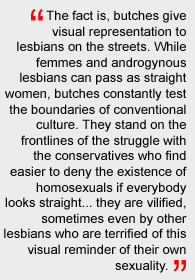It was strange Sunday read: A seemingly innocent article on how women were lapping up the free alcohol at Ladies' Nights at nightclubs, accompanied by another on pub owners moaning about "butches" driving away their business by turning up.

"Their presence has apparently irked some customers - of both sexes - who do not think of them as eye candy in the traditional sense. Besides, some argue, the butches sometimes create a scene when they bicker among themselves."
Here we go again.
Butches, the most visible - and probably most maligned - group of lesbians are hung out to dry whenever straight men feel the least bit threatened by their presence. Unthinking reporters or editors use them to sex up stories, which reinforces damaging stereotypes. It happens so often that I suspect most of us in the gay and lesbian community don't bat an eyelid anymore. We have learnt to stomach the occasional sock in the gut because while mainstream journalism in Singapore protects "family values," it does not guard against gay bashing.
Now that wouldn't be half as bad if gay and lesbian circles here were a bit more reflective about the stereotypes foisted on us. What I find disconcerting is how many queer people I come across who fail to, or simply choose not to, recognise the diversity among those who identify as butch.
Many lesbians I know find it difficult discussing the issue without dismissing it with motherhood statements like:
"We do not need labels. We are simply women who love women."
Then there are gay men who ponder on email forums:
"Though butches puzzle me when they insist on stuff like male names, pronouns, going to male washrooms... and then when it comes to free beer, they're okay with being officially female."
To which, I can only say, it's FREE beer. In a land where entire families skip lunch to attend buffet dinners, what is a few male-identified butches producing their dusty ID cards to save on some beer money? As far as I'm concerned, pub owners who give women free alcohol to attract male patrons take a commercial gamble. They should live by what it brings. But I digress.
The point is, not all butches use male names, male pronouns, or male washrooms. In fact, not all butches drink, much less bicker among themselves in drinking holes. It is one thing not to raise objections when straight people joke about menacing, hard-drinking and sexually voracious butches. It is another to perpetuate this stereotype among ourselves without a whimper of self-examination.
I speak as someone who refuses to spend my hard-earned money on tiny, strappy jokes of shoes that retailers insist on palming off to women in the name of fashion, someone who scoffs at anything frilly or figure-hugging because my idea of clothes is comfort. In so doing, and because I keep my hair short, I sometimes get called a butch.

Conventional definitions of the term "butch' mostly muddle more than clarify. According to the Concise Oxford Dictionary, being butch is being "tough-looking," a "mannish woman" or "a mannish lesbian." Chambers opts for the "'male' partner in a homosexual or lesbian relationship." Merriam-Webster Online describes the condition as being "notably or deliberately masculine in appearance or manner."
While most people can understand what it is to dress like a man, it is not quite clear what it is to act like a man. What exactly are we talking about? Chauvinism? Brash behaviour? Heavy drinking? I'm sure a lot of men out there - gay or straight - will baulk at being associated exclusively with such acts. What about the attributes of men? Again, this is not so clear as those commonly cited in popular culture - assertiveness, decisiveness, and rationality - are nothing but qualities a patriarchal world has insisted on ascribing only to men.
What is like then, to be a "mannish"? We have nothing to go on but perhaps someone's haircut, dressing and mannerisms.
The fact is, butches give visual representation to lesbians on the streets. While femmes and androgynous lesbians can pass as straight women, butches constantly test the boundaries of conventional culture. They stand on the frontlines of the struggle with the conservatives who find easier to deny the existence of homosexuals if everybody looks straight. They force aging toilet attendants to rethink their notions of man and woman when they stride into a female toilet and make clear they have a right to be in there. Because of this, they are vilified, sometimes even by other lesbians who are terrified of this visual reminder of their own sexuality.
The way I see it, we are better off separating the label from the behaviour. It is perfectly acceptable to dress, sit and walk like a man. It is also perfectly acceptable to turn up at Ladies' Nights dressed like a man for free drinks. But it is socially disruptive to pick fights with other people over inconsequential stares. It is self-destructive to drink yourself senseless, even if the alcohol is free. And it is repugnant to treat your partner - man or woman, gay or straight - with any less respect that you would accord yourself.
The clearer we make these distinctions, the easier it is for us to take issue with the right things. Only then, do we start to appreciate the diversity within our community. Only then, do we stop being part of the problem.
Do you have an opinion on the matter? You can either post your thoughts in the Forums (click link below) or email editor@fridae.com if you would like to contribute an article.












 打印版本
打印版本










读者回应
抢先发表第一个回应吧!
请先登入再使用此功能。